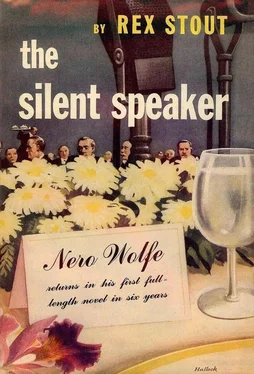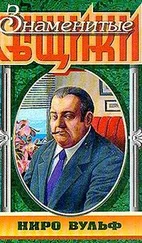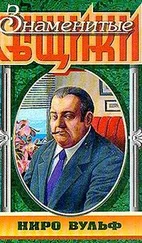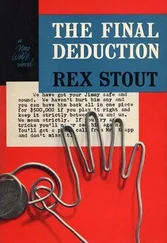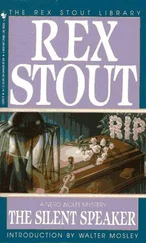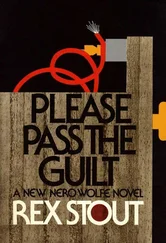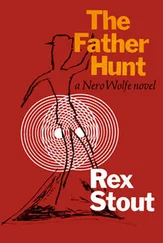“I’ll run you up,” I told her. “I have to put the car away anyhow.”
She told Wolfe good night, and we got our things on and went out and climbed in. She let her head fall back against the cushion and closed her eyes for a second, then opened then, straightened up, and flashed a glance at me.
“So you took Nero Wolfe on,” I remarked, as to a comparative stranger.
“Don’t be aloof,” she said. She reached to put her fingers around my arm, three inches below the shoulder, and press. “Don’t pay any attention to that. It doesn’t mean anything. Once in a while I like to feel a man’s arm, that’s all.”
“Okay, I’m a man.”
“So I suspected.”
“When this is over I’d be glad to teach you how to play pool or look up words in the dictionary.”
“Thanks.” I thought she shivered. “When this is all over.”
When we stopped for a light in the upper Forties she said, “You know, I believe I’m going to be hysterical. But don’t pay attention to that either.”
I looked at her, and there certainly wasn’t any sign of it in her voice or her face. I never saw anyone act less hysterical. When I pulled up at the curb at her address, she hopped out before I could move and stuck her hand in.
“Good night. Or what is the protocol? Does a detective shake hands with one of the suspects?”
“Sure.” We shook. It fitted nicely. “To get her off her guard.”
She disappeared inside, probably to give the doorman a brief glance on her way to the elevator, to strengthen his motive.
When I got back home, after putting the car away, and stopped in the office to make sure the safe was locked, there was a scribbled note lying on my desk:
Archie: Do not communicate further with Miss Gunther except on my order. A woman who is not a fool is dangerous. I don’t like this case and shall decide tomorrow whether to abandon it and refund the retainer. In the morning get Panzer and Gore here .
NW
Which gave me a rough idea of the state of confusion he was in, the way the note contradicted itself. Saul Panzer’s rate was thirty bucks a day, and Bill Gore’s was twenty, not to mention expenses, and his committing himself to such an outlay was absolute proof that there would be no retainer refund. He was merely appealing for my sympathy because he had taken on such a hard job. I went up two flights to my room, glancing at the door of his as I passed it on the first landing, and noting that the little red light was on, showing that he had flipped the switch for the alarm connection.
I realized all the more how hard the job was likely to be when, the next morning after Wolfe came down from the plant rooms at eleven o’clock, I heard him giving Saul Panzer and Bill Gore their instructions.
To anyone seeing him but not knowing him, Saul Panzer was nothing but a little guy with a big nose who never quite caught up with his shaving. To the few who knew him, Wolfe and me for instance, those details meant nothing. He was the one free-lance operative in New York who, year in and year out, always had at least ten times more jobs offered him than he had the time or inclination to take. He never turned Wolfe down if he could possibly help it. That morning he sat with his old brown cap on his knee, taking no notes because he never had to, while Wolfe described the situation and told him to spend as many hours or days at the Waldorf as might be necessary, milking and gathering eggs. He was to cover everything and everybody.
Bill Gore was full size and unpolished, and one glance at the top of his head showed that he was doomed. He would be bald in another five years. His immediate objective was the NIA office, where he was to compile certain lists and records. Erskine had been phoned to and had promised co-operation.
After they had departed I asked Wolfe, “Is it really as bad as that?”
He frowned at me. “As bad as what?”
“You know darned well what. Fifty dollars a day for the dregs. Where is there any genius in that?”
“Genius?” His frown became a scowl. “What can genius do with this confounded free-for-all? A thousand people, all with motive and opportunity, and the means at hand! Why the devil I ever let you persuade me—”
“No, sir,” I said loudly and firmly. “Don’t try it! When I saw how tough this was going to be, and then when I read that note you left for me last night, it was obvious you would try to blame it on me. Nothing doing. I admit I didn’t know how desperate it was until I heard you telling Saul and Bill to dive into the holes the cops have already cleaned out. You don’t have to admit you’re licked. You can wriggle out. I’ll draw a check to the NIA for their ten thousand, and you can dictate a letter to them saying that on account of having caught the mumps, or perhaps it would be better—”
“Shut up,” he growled. “How can I return money I haven’t received?”
“But you have. The check was in the morning mail and I’ve deposited it.”
“Good God. It’s in the bank?”
“Yes, sir.”
He pushed the button, savagely, for beer. He was as close to being in a panic as I remembered seeing him.
“So you have nothing,” I said without mercy. “Nothing whatever?”
“Certainly I have something.”
“Yeah? What?”
“Something Mr. O’Neill said yesterday afternoon. Something very peculiar.”
“What?”
He shook his head. “Not for you. I’ll put Saul or Bill on it tomorrow.”
I didn’t believe a word of it. For ten minutes I went over in my mind everything I remembered Don O’Neill saying, and then believed it less than ever.
All day Saturday he had no jobs for me connected with the Boone case, not even a phone call to make. The calls all came the other way, and there were plenty of those. Most of them, from newspapers and Cramer’s office and so on, were nothing but blah. Two of them were merely comic relief:
Winterhoff, the Man of Distinction, phoned around noon. He wanted something for his money right away. The cops were after him. Many hours of questioning about fourteen people had got it settled that it was he who had suggested the little room near the stage for Boone’s privacy and had escorted him there, and he was being harassed. He had explained that his knowledge of the room had come from his participation in previous affairs on those premises, but they weren’t satisfied. He wanted Wolfe to certify to his innocence and instruct the police to let him alone. His order wasn’t filled.
Just before lunch there was a call from a man with an educated voice who said his name was Adamson, of counsel for the NIA. His tone implied that he wasn’t very crazy about Wolfe’s being hired anyway, and he wanted practically everything, including a daily report of all actions. He insisted on speaking to Wolfe, which was a mistake on his part, because if he had been willing to talk with me I might at least have treated him with common courtesy.
Another thing the NIA wanted the very day we got their retainer check was something we couldn’t have furnished even if we had felt like it. This request was brought by their Hattie Harding in person, in the middle of the afternoon, just after Wolfe went up to the orchids. I took her to the office and we sat on the couch. She was still well put together and well dressed, and her eyes were still competent, but the strain was telling on her. She looked much nearer forty-eight than twenty-six.
She had come to yell for help, though she didn’t put it that way. To hear her tell it, there was hell to pay from coast to coast and the end of the world was expected any minute. Public Relations was on its last legs. Hundreds of telegrams were pouring into the NIA office, from members and friends all over the country, telling of newspaper editorials, of resolutions passed by Chambers of Commerce and all sorts of clubs and groups, and of talk in the street. Even — this was strictly off the record — eleven resignations had been received from members, one a member of the Board of Directors. Something had to be done.
Читать дальше
